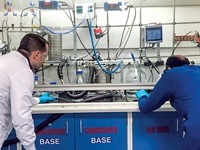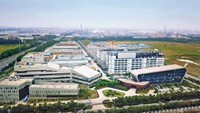Advertisement
Grab your lab coat. Let's get started
Welcome!
Welcome!
Create an account below to get 6 C&EN articles per month, receive newsletters and more - all free.
It seems this is your first time logging in online. Please enter the following information to continue.
As an ACS member you automatically get access to this site. All we need is few more details to create your reading experience.
Not you? Sign in with a different account.
Not you? Sign in with a different account.
ERROR 1
ERROR 1
ERROR 2
ERROR 2
ERROR 2
ERROR 2
ERROR 2
Password and Confirm password must match.
If you have an ACS member number, please enter it here so we can link this account to your membership. (optional)
ERROR 2
ACS values your privacy. By submitting your information, you are gaining access to C&EN and subscribing to our weekly newsletter. We use the information you provide to make your reading experience better, and we will never sell your data to third party members.
Pharmaceuticals
Chiral Quest Takes On A New Mission
To compete, catalyst developer expands its custom manufacturing strategy
by Ann M. Thayer
March 16, 2009
| A version of this story appeared in
Volume 87, Issue 11
COMBINING a Western business base with low-cost production in the East has recently become a common strategy for custom chemical firms. For Chiral Quest and its founder Xumu Zhang, the advantages of using science and technology to connect East and West have long been obvious.
Zhang himself personifies this kind of scientific transfer. He received his undergraduate education in China and completed his graduate work at Stanford University, in California. Most of his professional career has been spent in the U.S., where he has been a chemistry professor at Pennsylvania State University and is now at New Jersey's Rutgers University, but he holds guest professorships in China as well.
In 2000, Zhang realized his passion for business by founding Chiral Quest to commercialize chiral ligands and catalysts developed in his academic lab. A lot has happened since then. Zhang has been on a corporate roller-coaster ride that in just a few years has transformed his company from a chiral catalyst specialist into a manufacturer of pharmaceutical chemicals.
"The company is evolving," explains Zhang, who is its chief technology officer and a significant shareholder. Although catalysts for asymmetric synthesis remain Chiral Quest's scientific backbone, the company has added process development and the production of intermediates and active pharmaceutical ingredients. As Chief Executive Officer Joseph Marasco puts it, Chiral Quest is "moving away from being a research boutique to become a bona fide custom chemical supplier."
The Monmouth Junction, N.J.-based company's first few years were relatively quiet. It became publicly traded in 2003 and added scale-up facilities in Jiashan, China, in 2005.
That year, however, Chiral Quest's then-investors decided to get into the drug business. As a result, Chiral Quest became a subsidiary of VioQuest Pharmaceuticals. But the combination never clicked. By 2007, VioQuest sold the chemical side of its business in a nearly $3 million buyout led by Chiral Quest managers. VioQuest itself ran out of cash in 2008.
Back on their own, Zhang and his colleagues embarked on the new manufacturing strategy and started looking for the money to fund it. They managed to raise $13 million in a late-2008 round of venture capital funding. The lead investors were Kleiner Perkins Caufield & Byers China and the China Spring Fund, along with Japan Asia Investment and Infinity I-China.
Chiral Quest is putting some of the funds toward a multi-million-dollar pilot plant in Suzhou, China, that will operate under the U.S. Food & Drug Administration's current Good Manufacturing Practices (cGMP) standards.
"What we do in China is not just because of cheap labor, but we are putting good scalable commercial technology there," Zhang says. As China shifts toward becoming a major manufacturing location and pharmaceutical end market, innovative processes and experienced people will be needed, he explains.
THE SENTIMENT is echoed by Chiral Quest's investors. China is very much set for growth, says Amir Gal-Or, founder and managing partner of Infinity I-China, an investment fund created by Israel's Infinity Equity and Chinese and Israeli partners.
"Given that China is changing, we are bringing the value of technology and know-how, and we see a lot of demand from Chinese players," Gal-Or continues. Infinity is increasing its presence both in China and in the medical arena. Although Chiral Quest doesn't fit this bill explicitly, Gal-Or says he was attracted by the firm's technology and talent, along with the scalability of its business and its access to the generic drug market.
Infinity's decision to invest is also related to its partnership with Suzhou Industrial Park, a cooperative program between the Chinese and Singapore governments. The park's BioBay high-technology arm is partially funding Chiral Quest's 200,000-sq-ft facility and helping to build it.
After construction is completed in May, Chiral Quest plans to expand its workforce from about 80 employees to more than 200 within about 12 months.
Meanwhile, to guide its transition into manufacturing, Chiral Quest has added a new management team familiar with both pharmaceuticals and fine chemicals. Marasco's background includes 23 years in the drug industry and senior leadership roles at Kaneka and Chirotech, which was acquired by Dow Chemical and later sold to Dr. Reddy's Laboratories, based in India.
Other recent hires include new vice presidents for business development: In Europe Ian Lennon joined from Chirotech, and in North America Elena Chekhova came aboard from deCode Chemistry. Chiral Quest's new R&D vice president is Jingyang Zhu, who managed Bristol-Myers Squibb's process development labs.
"We're building the company to be a true player and viable supplier using advantaged chemistries to design innovative routes," Marasco explains. Company scientists will conduct process development and scale-up for pharmaceutical company customers. Projects are to remain in-house through the largest scale Chiral Quest can handle, which in the new plant will reach up to 3,000 L for non-GMP work and 1,000 L for cGMP production.
For now, commercial API production may involve working with partners. Processes developed by Chiral Quest will be transferred directly to its own or third-party facilities, likely in China because of the company's strong ties to the country.
Chiral chemistry has become a relatively mature offering in the fine chemicals world. Although Chiral Quest has strong capabilities in asymmetric catalysis and carbon-carbon coupling chemistries, it, like other catalyst developers, is diversifying and looking to manufacturing to move ahead. "It is more powerful to use the technology to make pharmaceutical products than trying to make a living just selling catalysts," Lennon says.
Chiral Quest will continue to offer its catalog of chiral intermediates and building blocks. On the catalyst side it will focus on the five proprietary ones it has commercialized and can produce in bulk. "Those five do most of the chemistry we need," Lennon explains, noting that the catalysts have been used to make intermediates and APIs on the ton scale. Meanwhile, Zhang's research on new catalysts and reactions will continue to flow into the company.
Lennon and the other managers believe business prospects are substantial: 80% of approved drugs have chiral centers. Even within the chiral arena, suppliers need to have a range of technologies, and Chiral Quest intends to expand its portfolio, possibly through partnerships, Lennon says.
"We'll find the best technology for the molecule and apply it," he explains. "There are enough opportunities out there with small molecules in the pipeline that, with good technology, you can differentiate yourself in the marketplace."






Join the conversation
Contact the reporter
Submit a Letter to the Editor for publication
Engage with us on Twitter